Results
-
£13.95
Time to Shine - Score only - Andrew Mackereth
Program NotesThis piece sets out to capture the spirit and fun of a theatrical stage-dance routine. Many will be familiar with the children's song Jesus Bids Us Shine on which it is based.The piece is very light-hearted in character, and would easily lend itself to the addition of some imaginative choreography that could prove extremely entertaining and amusing on the right occasion!In its original brass band form, the piece was written for The Salvation Army's Melbourne Staff Band when they toured the UK in 2001. It was used to great effect by the band on that trip.
Estimated dispatch 7-14 working days
-
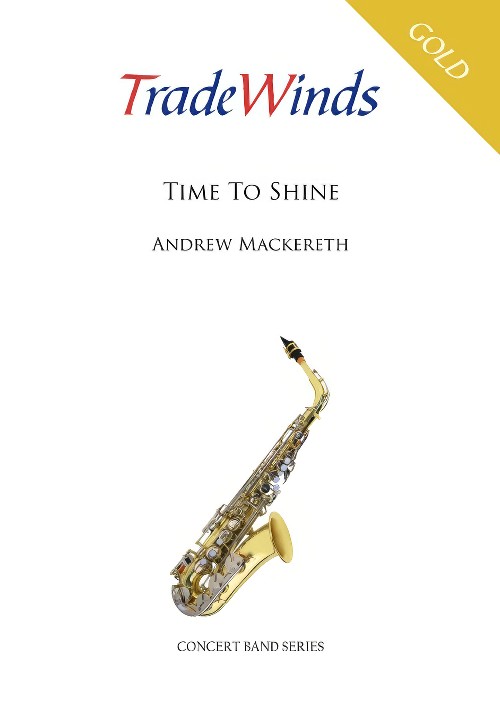 £13.95
£13.95Time To Shine (Concert Band - Score Only) - Mackereth, Andrew
This piece is based on the children's song 'Jesus bids us shine' and sets out to capture the spirit and fun of a theatrical stage-dance routine.
Estimated dispatch 7-14 working days
-
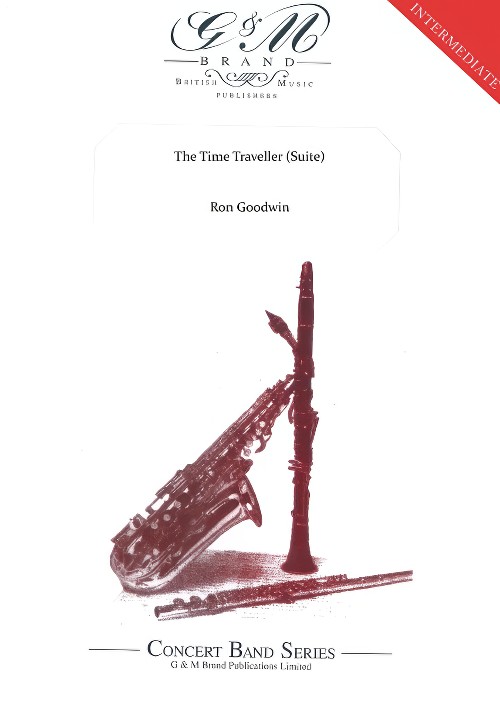 £16.95
£16.95The Time Traveller (Suite) (Concert Band - Score Only) - Goodwin, Ron
This 3-movement tribute to H.G. Wells perfectly captures the imagination and wonderment found in the author's collection of works. The first movement is a march that could easily be extracted and performed on its own as a nice alternative to Sousa.
Estimated dispatch 7-14 working days
-
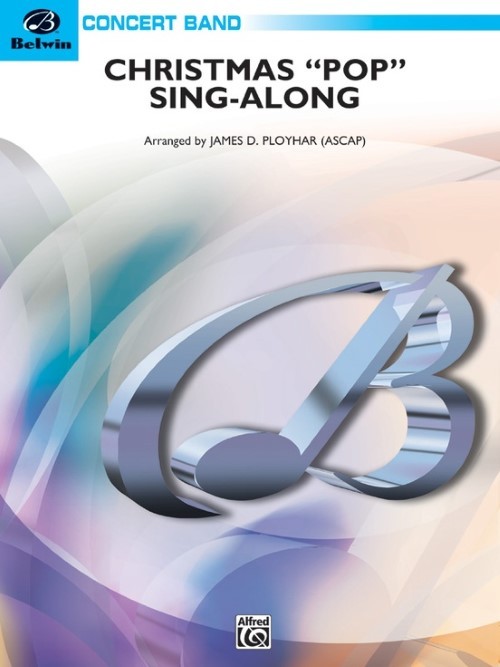 £70.50
£70.50Christmas Pop Sing-Along (Concert Band - Score and Parts) - Ployhar, James D.
The holiday season is probably the only time of year that your audience knows both the melody and the words to your band's music. Here is the opportunity for them to join in singing. Titles include: Santa Claus Is Comin' To Town * Silver Bells * Rudolph the Red-Nosed Reindeer * Have Yourself A Merry Little Christmas. Includes a songsheet.
Estimated dispatch 7-14 working days
-
 £137.99
£137.99Welcome Overture - Otto M. Schwarz
Composed in commemoration of the 2006 Football World Cup. The World Cup is a global event that only takes place every four years and that is preceded by a number of qualifying rounds. In the actual event, the final tournament, only the best in the world meet. It is a special honor and responsibility to be the host of the final tournament. Welcome Overture musically expresses hospitality and warmth towards all people, regardless of colour or race; an attitude that is symbolic of the World Cup. A fantastic work that your audiences will enjoy time and time again.
Estimated dispatch 7-14 working days
-
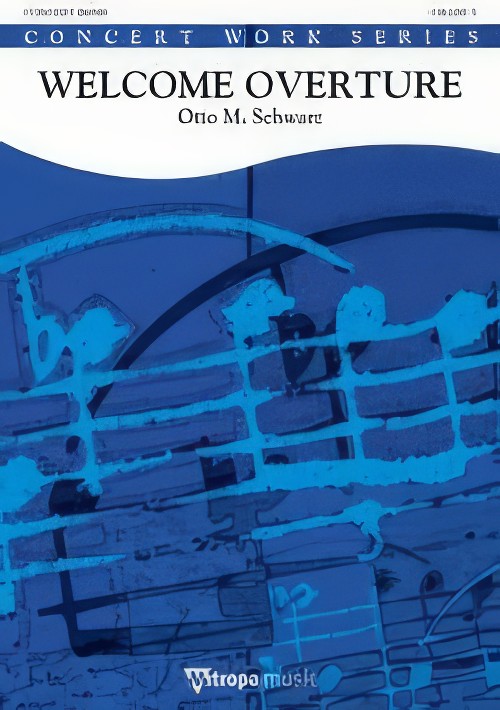 £137.99
£137.99Welcome Overture (Concert Band - Score and Parts) - Schwarz, Otto M.
Composed in commemoration of the 2006 Football World Cup. The World Cup is a global event that only takes place every four years and that is preceded by a number of qualifying rounds. In the actual event, the final tournament, only the best in the world meet. It is a special honour and responsibility to be the host of the final tournament. Welcome Overture musically expresses hospitality and warmth towards all people, regardless of colour or race; an attitude that is symbolic of the World Cup. A fantastic work that your audiences will enjoy time and time again.
Estimated dispatch 7-14 working days
-
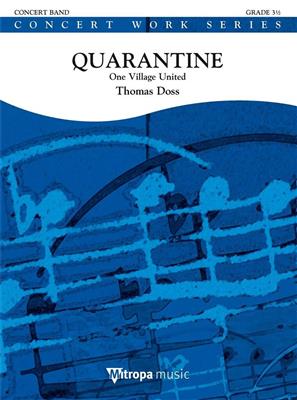 £119.99
£119.99Quarantine - Thomas Doss
Like a dark veil, an ominous sense of foreboding takes hold across the world. A looming danger, one previously unknown to mankind, slowly approaches, bringing our daily lives to a grinding halt. A perilous virus gives us no choice other than to stay in our homes, leaving us unable to work in our offices or even visit family and friends. Something that has only been talked about in history books is coming to pass: a pandemic! The invisible danger expands more and more, and we feel paralysed by fear and fright. The distance between us and our fellow human beings increases. At the same time, we start to better understand something crucial: we have time again! People help each other out. Neighbourly assistance and support within one's own family becomes more apparent. We stand by each other. Suddenly we have the time for things that we did not have before. Time for reflection... A new era commences. Finally, hope reappears. We leave our houses, but nothing is quite the same anymore. With renewed strength, people begin to perceive the future in a positive and optimistic way once again. With greater attention and awareness of the here and now, we feel that, despite it all, we can be happy.Recorded by the Kobe College Wind Orchestra and its conductor Satoshi Yagisawa
Estimated dispatch 7-14 working days
-
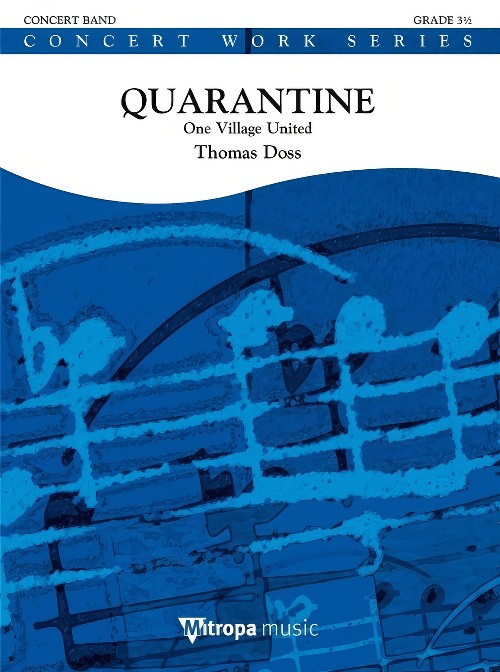 £119.99
£119.99Quarantine (One Village United) (Concert Band - Score and Parts) - Doss, Thomas
Like a dark veil, an ominous sense of foreboding takes hold across the world. A looming danger, one previously unknown to mankind, slowly approaches, bringing our daily lives to a grinding halt. A perilous virus gives us no choice other than to stay in our homes, leaving us unable to work in our offices or even visit family and friends. Something that has only been talked about in history books is coming to pass: a pandemic! The invisible danger expands more and more, and we feel paralysed by fear and fright. The distance between us and our fellow human beings increases. At the same time, we start to better understand something crucial: we have time again! People help each other out. Neighbourly assistance and support within one's own family becomes more apparent. We stand by each other. Suddenly we have the time for things that we did not have before. Time for reflection... A new era commences. Finally, hope reappears. We leave our houses, but nothing is quite the same anymore. With renewed strength, people begin to perceive the future in a positive and optimistic way once again. With greater attention and awareness of the here and now, we feel that, despite it all, we can be happy. Duration: 8.00
Estimated dispatch 7-14 working days
-
 £123.20
£123.203 Letzte Motetten - Anton Bruckner
Anton Bruckner (b. 4.9.1824, Ansfelden, d. 11.10.1896, Vienna) didn't have it easy. Throughout his life, the Austrian composer was plagued by self-doubt. Anton Bruckner came from a simple, rural background. After the death of his father, he was accepted as a choirboy at the monastery of Sankt Florian in 1837. After several years as a school assistant and his own organ and piano studies, he first worked as organist in St. Florian, then from 1855 as cathedral organist in Linz. Introduced to music theory and instrumentation by Simon Sechter and Otto Kitzler, he discovered Richard Wagner as an artistic role model, whom he admired throughout his life and also visited several times in Bayreuth.In 1868 Anton Bruckner became professor of basso continuo, counterpoint and organ at the Vienna Conservatory; ten years later court organist; and in 1891 finally honorary doctor of the University of Vienna. He was considered an important organ virtuoso of his era, but had to wait a long time for recognition as a composer. It was not until Symphony No.7 in E major, composed between 1881 and 1883, with the famous Adagio written under the effects of Wagner's death, that he achieved the recognition he had hoped for, even if he was reluctant to accept it given his inclination towards scepticism and self-criticism.Anton Bruckner was a loner who did not want to follow a particular school or doctrine. He composed numerous sacred vocal works, such as his three masses, the Missa Solemnis in B flat minor (1854), the Te Deum (1881-84) and numerous motets. As a symphonic composer, he wrote a total of nine symphonies and many symphonic studies from 1863 onwards, tending to revise completed versions several times over. Bruckner's orchestral works were long considered unplayable, but in fact were merely exceptionally bold for the tonal language of their time, uniting traditions from Beethoven through Wagner to folk music, on the threshold between late Romanticism and Modernism.Anton Bruckner composed about 40 motets during his lifetime, the earliest a setting of Pange lingua around 1835, and the last, Vexilla regis, in 1892.Thomas Doss has compiled some of these motets in this volume for symphonic wind orchestra.These motets show many characteristics of personal expression, especially Bruckner's colourful harmony in the earlier works, which is in places aligned with Franz Schubert (changes between major and minor; and movements in thirds). Later works are characterised by many components which, in addition to the expanded stature of the movements, include above all a sense of the instrumentation as an outward phenomenon and the harmony as a compositional feature that works more internally. Some aspects of Bruckner's work are the result of his long period of study, which familiarised him not only with the tradition of his craft, but also gave him insights into the "modernity" of his time in such composers as Wagner, Liszt and Berlioz.From this developed his personal standpoint, which always pursues the connection between the old and the new.
Estimated dispatch 7-14 working days
-
 £256.00
£256.0014 Motetten - Anton Bruckner
Anton Bruckner (b. 4.9.1824, Ansfelden, d. 11.10.1896, Vienna) didn't have it easy. Throughout his life, the Austrian composer was plagued by self-doubt. Anton Bruckner came from a simple, rural background. After the death of his father, he was accepted as a choirboy at the monastery of Sankt Florian in 1837. After several years as a school assistant and his own organ and piano studies, he first worked as organist in St. Florian, then from 1855 as cathedral organist in Linz. Introduced to music theory and instrumentation by Simon Sechter and Otto Kitzler, he discovered Richard Wagner as an artistic role model, whom he admired throughout his life and also visited several times in Bayreuth.In 1868 Anton Bruckner became professor of basso continuo, counterpoint and organ at the Vienna Conservatory; ten years later court organist; and in 1891 finally honorary doctor of the University of Vienna. He was considered an important organ virtuoso of his era, but had to wait a long time for recognition as a composer. It was not until Symphony No.7 in E major, composed between 1881 and 1883, with the famous Adagio written under the effects of Wagner's death, that he achieved the recognition he had hoped for, even if he was reluctant to accept it given his inclination towards scepticism and self-criticism.Anton Bruckner was a loner who did not want to follow a particular school or doctrine. He composed numerous sacred vocal works, such as his three masses, the Missa Solemnis in B flat minor (1854), the Te Deum (1881-84) and numerous motets. As a symphonic composer, he wrote a total of nine symphonies and many symphonic studies from 1863 onwards, tending to revise completed versions several times over. Bruckner's orchestral works were long considered unplayable, but in fact were merely exceptionally bold for the tonal language of their time, uniting traditions from Beethoven through Wagner to folk music, on the threshold between late Romanticism and Modernism.Anton Bruckner composed about 40 motets during his lifetime, the earliest a setting of Pange lingua around 1835, and the last, Vexilla regis, in 1892.Thomas Doss has compiled some of these motets in this volume for symphonic wind orchestra.These motets show many characteristics of personal expression, especially Bruckner's colourful harmony in the earlier works, which is in places aligned with Franz Schubert (changes between major and minor; and movements in thirds). Later works are characterised by many components which, in addition to the expanded stature of the movements, include above all a sense of the instrumentation as an outward phenomenon and the harmony as a compositional feature that works more internally. Some aspects of Bruckner's work are the result of his long period of study, which familiarised him not only with the tradition of his craft, but also gave him insights into the "modernity" of his time in such composers as Wagner, Liszt and Berlioz.From this developed his personal standpoint, which always pursues the connection between the old and the new.
Estimated dispatch 7-14 working days
